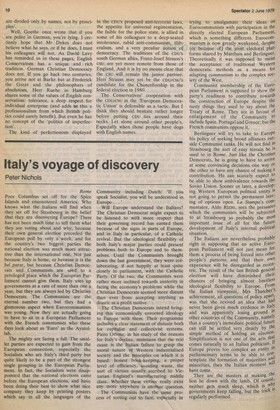Italy's voyage of discovery
Peter Nichols
Rome Poor Columbus set off for the Spice Islands and encountered America. Who knows what the Italians will find when they set off for Strasbourg in the belief that they are discovering Europe? There has not been much time to tell them what they are voting about and why, because their own general election preceded the European poll by only a week, and for the country's two biggest parties the national election was much more attractive than the international one. Not just because Italy is home, or because it is the bel paese, but because Christian Democrats and Communists are used to a privileged place which the European Parliament cannot give them. Italy uses up governments at a rate of more than one a year, but they are always led by Christian Democrats. The Communists are the eternal number two, but they had a glamorous aspect when Eurocommunism was young. Now they are actually going to have to sit in a European Parliament with the French communists who these days look about as 'Euro' as the Ayatollah.
The mighty are facing a fall. The smaller parties are expected to gain from the European connection, especially the Socialists who are Italy's third party but quite likely to be a part of the strongest single grouping in the European Parliament. In fact, the Socialists were disappointed that the national elections came before the European elections, and have been doing their best to show what nice company they keep by printing posters which say in all the languages of the Community including Dutch: 'If you speak Socialist, you will be understood in Europe ... '
Will Europe understand the Italians? The Christian Democrat might expect to be listened to with more respect than their governing record has earned them because of the signs in parts of Europe, and in Italy in particular, of a Catholic revival. But the ideological flexibility of both Italy's major parties could present problems both to Europe and to themselves. Until the Communists brought down the last government, they were collaborating, if not happily at least quite closely in parliament, with the Catholic Party. Of the two, the Communists were rather more inclined towards austerity in facing the economy's problems while the Christian Democrats seemed more distant than ever from accepting anything as drastic as a profit motive.
The Christian Democrats intend bringing this economically unrooted ideology to Europe with them. Their programme includes a clear statement of distaste both for capitalist and collectivist systems. Piero Ottone, in his study of the reasons for Italy's decline, maintains that the real cause is the Italian failure to grasp the moral nature of Western industrialised society and the principles on which it is based: honest book-keeping, a proper level of efficiency, avoiding waste, the sort of virtues usually ascribed to Victorian England's manufacturing middle class. Whether these virtues really exist any more anywhere is another question.
The Communists have the same process of sorting out to face, especially in trying to amalgamate their ideas on Eurocommunism with participation in the directly elected European Parliament, which is something different. Eurocommunism is now greatly weakened, despite (or because of) the joint electoral platforms shared by Marchais and Berlinguer. Theoretically it was supposed to mean the acceptance of traditional Western democratic methods as a means for adapting communism to the complex society of the West.
Communist membership of the European Parliament is supposed to show the party's readiness to contribute towards the construction of Europe despite the nasty things they used to say about the Treaty of Rome. They arc in favour of enlargement of the Community to include Spain. Portugal and Greece; but the French communists oppose it.
Berlinguer will try to take to Europe his policy of seeking broad alliances outside Communist ranks. He will not find 10 Strasbourg the sort of easy terrain he Is used to in Rome. Just like the Christian Democrats, he is going to have to arrive at some convincing decisions one way or the other to have any chance of making a contribution. He can scarcely expect to be able to show ambivalence towards the Soviet Union. Sooner or later, a developing Western European political entity Is not going to permit the permanent leaving of options open. La Stampa's coolmentator, Aldo Rizzo, sees the pressures which the communists will be subjected to at Strasbourg as probably the most important issue of all for the future development of Italy's internal political situation.
The Italians are nevertheless probably right in supposing that an active European Parliament will not just mean for them a process of being forced into other people's patterns and that their owil experience will be disregarded as eccentric. The result of the last British general election will have diminished their chances of bringing almost limitless ideological flexibility to Europe. Frotr the Italian viewpoint, Mrs Thatcher s achievement, all questions of policy aPart; was that she revived an idea that hau never been given much credence in Ita.lY and was apparently losing ground In other countries of the Community, namelY that a country's immediate political future can still be settled very clearly by the simple method of holding an election. Simplification is not one of the arts that, comes naturally to an Italian politician. .11 Europe proves too complex an entity In parliamentary terms to be able to eon; template the formation of majorities an°, minorities, then the Italian moment WI have come. They are the masters at making the lion lie down with the lamb. Of course' neither gets much sleep, which is wil.Y governments keep falling, but the trick Is regularly performed.






































 Previous page
Previous page